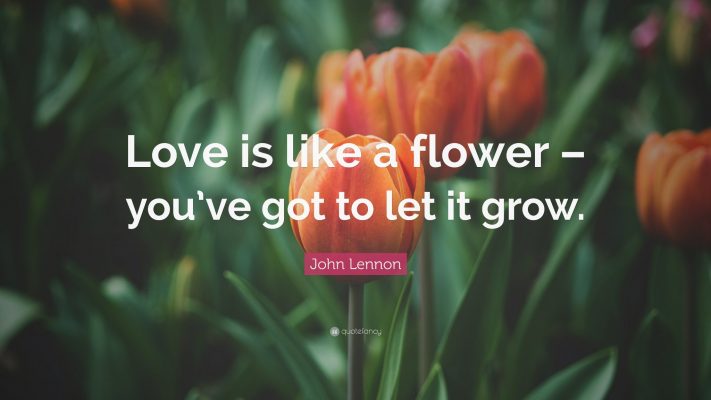Share
LOVE AND GROW UP
Love and Spiritual Practices
That day, you and I were talking. We were discussing a younger girl, much younger than us, whose boyfriend had planned a visit from afar. She was very happy, even though they had broken up and gotten back together countless times. I blurted out, “Why does it have to be this way? If you know it won’t go far, what’s the point of being happy?” You replied, “Not everyone loves to get married, and besides, she still has plenty of time to enjoy love.” I nodded, because each person has their own life choices at different stages.
Here, I don’t intend to compare how love should be or that love must always be about marriage, or that once you’re married, you don’t need love anymore. In fact, some people even realize love after getting married. Reflecting on these stages of love makes me smile. Looking for someone to love for the sake of fun, to experience the feeling of having someone to love and be loved, is like enjoying a journey; while looking for someone to love with a long-term commitment is more about enjoying the destination than the journey itself. When we are young, especially as women, we don’t feel the pressure of the “biological clock” inside us, so it’s fun to pair up with different people, to experience caring for someone and being cared for, to open up our personal space for others to enter and stepping into theirs—something so new, curious, and exciting, but also filled with dramas, quarrels, and misunderstandings. In the state of having nothing to lose (because we allow ourselves to experience and explore, to love many people), love becomes more carefree, less anxious, less calculating. Even if we break up, we won’t feel sad or regretful for long, because “sadness and regret come from the feeling of loss,” but when we’re in an exploratory state, there’s nothing to lose, so there’s little sadness and regret. And if we find a new love right away, it’s easy to forget the old one, hehe.
But as we age, time and energy are divided by work and other life responsibilities, and most of us start to look for someone to marry. This is where the drama begins to rise, because after experiencing love in youth, love now becomes less fresh, less exciting, while worries multiply. For example, when we were younger, we liked a guy just because he was cool; now, even if he’s still cool, his family background is something we need to think about. If in our youth we went through too many dramas, we inevitably carry that drama mindset into our current relationship. For instance, if we once loved a guy who was juggling multiple relationships and discovered that we were just one of the many, we may now be constantly worried and suspicious that he’s still fishing for someone else. And the biological clock keeps ticking. There are times when it’s hard to let go, but it’s also hard to stay. In general, this might be the phase of love that’s less fun because “there’s more to lose.” There are also people who only discover love after marriage, but they fall in love with someone else, not their spouse. Perhaps this is the case that involves the most internal conflict, because when someone is in love, it’s hard to hide the “blossoming” of their feelings, but they also have to “live in fear,” because now they have much more to lose—things like face, ego, children, and wealth.

Does love still bring joy like this? Does living like this still bring happiness in the end?
What do you think? I now find it amusing and see life becoming a vicious circle, unnecessarily complicated.
When we love ourselves enough, we realize that some things aren’t as they seem, and we can completely choose simpler and more joyful experiences in love.
For example:
-
When someone becomes jealous and controlling, that behavior doesn’t come from love but from possessiveness. Being with someone who has excessive possessiveness is like taking away your own physical and mental freedom.
-
When someone envies you, it’s because they lack self-confidence or trust in themselves. Such a person is likely not only to not support you but to bring you down whenever they get the chance, or they might do destructive things instead of building, just to affirm their own ego.
-
Someone who can’t be honest with themselves, who refuses to acknowledge their actions regardless of whether they’re right or wrong, won’t have the ability to grow from failure.
-
Someone who always tries to make you follow their way because they want what’s best for you lacks the ability to listen and respect differences.
-
Someone who constantly complains about old issues carries the burden of the past into the present and will rarely be happy in the present.
And so on. We can also be in these states when we lack self-awareness and haven’t loved ourselves enough.
Looking back at these obvious things, I see them as empty seeds. If we keep trying to plant them, it’s clear that there won’t be a bountiful harvest. So why are we pursuing them?
Why not choose good seeds? Or why not transform ourselves into good seeds first, and then plant them, so we can enjoy the joy of sowing, cultivating, and harvesting?
Love always contains lessons and experiences that help us grow. Don’t confuse maturity with less joy. True maturity in awareness is truly joyful, at least because it makes life simpler and frees us from unnecessary complexity. Love in the process of mature awareness is joyful both in the journey and in the destination.
No matter your age or current state of love, try looking at it from a different perspective and set a different goal for love — for example, love to grow yourself, and see how your relationships and life become lighter, more open, and more relaxed.
I look forward to hearing your thoughts.
